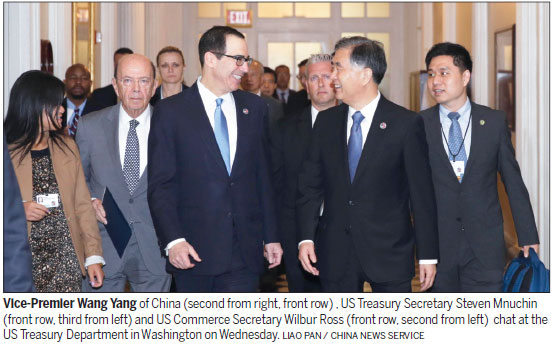
Senior Chinese and U.S. government officials spoke positively of their first Comprehensive Economic Dialogue (CED) in Washington on Wednesday after they reached a wide consensus.
Chinese Vice-Premier Wang Yang, U.S. Treasury Secretary Steven Mnuchin and U.S. Commerce Secretary Wilbur Ross co-chaired the meeting held at the U.S. Treasury Department, where the two sides discussed bilateral trade and investment, the 100-Day Action Plan and One-Year Plan, global economy and governance, and macroeconomic policy, finance and agriculture.
Wang said that cooperation is the only correct choice for China and the U.S., which are each other's largest trade partner and important source of foreign investment.
"Good cooperation between China and the U.S., the world's two largest economies, will not only benefit the businesses and people of the two countries, but the entire world," he said.
Chinese Vice-Finance Minister Zhu Guangyao said a major task for the CED was reviewing the progress on the consensus reached by President Xi Jinping and U.S. President Donald Trump when they met in Florida in early April.
In their first summit at Trump's Mar-a-Lago estate, the two leaders agreed on a four-track comprehensive dialogue mechanism, including the CED and a 100-Day Action Plan for economic cooperation.
"Both sides spoke highly of the implementation of the 100-Day Action Plan," Zhu told the press on Wednesday after the conclusion of the CED.
Meanwhile, the two sides agreed to start their One-Year Action Plan for economic cooperation and strive for early harvest, according to Zhu, who has been deeply involved in the Chinese preparation for the CED.
He expressed the two sides will do their utmost on the One-Year Plan.
During the Wednesday meeting, the two sides agreed to pursue economic cooperation based on the principle of win-win cooperation. Both sides also agreed to resort to dialogue and negotiation in addressing their differences. The two governments also agreed to keep their communication on major economic policy issues.
Zhu noted that while the CED was a one-day event, the teams on both sides have kept their contact on a daily basis, sometimes even several times a day. He said the close contacts have reflected a spirit of mutual respect and helped improve understanding and strategic trust.
Wang also praised the two teams, saying the biggest achievement of the CED is the increased understanding and trust between the two teams, which will play a positive role in advancing the China-U.S. economic relationship.
"Since the presidential summit, the first 100 days made progress on important issues including credit ratings, bond clearing, electronic payments, commercial banking and liquefied natural gas. Also, this is the first time since 2003 that the Chinese have allowed for imports of American beef," said a statement by Mnuchin and Ross after the meeting.
It said that China acknowledged the shared objective on the trade deficit, which both sides will work cooperatively on to achieve.
"The principles of balance, fairness and reciprocity on matters of trade will continue to guide the American position so we can give American workers and businesses an opportunity to compete on a level playing field," the U.S. statement said.
About 20 Chinese and U.S. business leaders, including Jack Ma of Alibaba Group and Stephen Schwarzman of the Blackstone Group, met on Tuesday in Washington to help push for expanded economic cooperation between the two countries.
Bilateral trade between China and the U.S. hit $519 billion in 2016. China is the destination for 26 percent of U.S.-exported Boeing aircraft, 56 percent of its soybeans, 16 percent of its automobiles, and 15 percent of its farm products.
China is also one of the fastest-growing markets for U.S. exports. In the past decade, U.S. exports to China increased 11 percent a year on average, while China's exports to the U.S. grew 6.6 percent. The U.S. maintains a surplus with China in service sector trade while running a deficit in the trade of goods.


















































